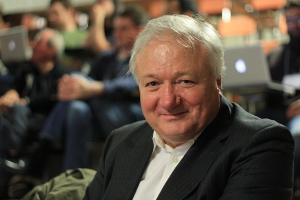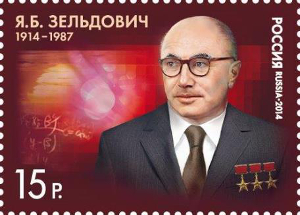 |
|
MPA-Director Rashid Sunyaev
© MPA
|
 |
 |
|
Russian commemorative stamp on the occasion of 100 years since the birth of Ya Zel'dovich
|
|  |
The Scientific Council of the A.F.Ioffe Physical-Technical Institute of Russian
Academy of Sciences, one of the largest scientific institutes in Russia,
nominated Rashid Sunyaev for a series of papers, in which he and Ya. B.
Zel'dovich predict the existence of two important milestones in the evolution of
the Universe: (1) the last scattering surface of photons and (2) the blackbody
photosphere of the universe. In addition, the papers also describe the existence
of inevitable distortions of the CMB spectrum from a pure Planck spectrum (for
references see below).
According to the Big Bang model, the universe started in an infinitely dense and
hot state, rapidly expanding in its first few moments. As it stared to cool, a
hot plasma formed and eventually the electrons combined with protons forming
hydrogen (the so-called recombination) after about 380 000 years (or at a
redshift of 1090). This leads to the presence of the last scattering surface,
i.e. after the recombination photons can move more or less freely through space
and one can observe them as the cosmic microwave background (CMB). While very
homogeneous on the whole, there are tiny angular fluctuations and acoustic peaks
in the power spectrum of the CMB, which have been observed by the cosmological
satellites WMAP (2001-2010) and PLANCK (2009-2013). These observations
demonstrated that Zel'dovich and Sunyaev (1970a) evaluated the location and
effective width of the last scattering surface with an accuracy of a few
percent.
Furthermore, Sunyaev and Zel'dovich found an analytical solution that describes
how the CMB is blurred and deviates from a pure Planck black-body spectrum due
to the combined action of bremsstrahlung (or double Compton) at low frequencies
and comptonization of photons on Maxwellian electrons, which leads to a
redistribution of photons in frequency. The numerical calculations of recent
years have proved faithful to the classical result: the energy release in the
early universe (at redshifts greater than 2 million) does not leave traces on
the observed spectrum of the CMB. However, the noticeable energy release of any
nature at lower redshifts leaves typical spectral distortions.
Several satellite projects, capable of searching for this spectral distortion of
the CMB, were submitted for consideration to NASA and ESA. Furthermore, recent
papers of Sunyaev and R. Khatri demonstrated that the analytical solution of
Zel'dovich and Sunyaev (1970b) describes the location of the blackbody
photosphere of the universe with an accuracy of 10%.
Papers:
1. Sunyaev, R.A., Zel'dovich, Ya.B., 1970a, Small scale fluctuations of relic
radiation, Astrophysics and Space Science, Vol.7, pp. 3-19 (554 citations)
2. RA Sunyaev, Zel'dovich, Ya.B., 1970b, The interaction of matter and radiation
in the hot model of the universe, II, Astrophysics and Space Science, Vol. 7,
pp.20-30 (189 citations)
3. RA Sunyaev, Zel'dovich, Ya.B., 1970c, The spectrum of the primordial
radiation, its distortions and their significance, Comments on Astrophysics and
Space Physics , Vol. 2, pp. 66-73 (152 citations)
4. RA Sunyaev, Zel'dovich, Ya.B., 1980, Microwave background radiation as a
probe of the contemporary structure and history of the universe, Annual Review
of Astronomy and Astrophysics, Volume 18, pp. 537-560 (510 citations)
R. Sunyaev, Khatri, R., 2013, Unavoidable CMB Spectral Features and Blackbody
Photosphere of our Universe, International Journal of Modern Physics D, Vol.
22, Issue 7, id. 1330014
Khatri, R., R. Sunyaev, 2012, Creation of the CMB spectrum: precise analytic
solutions for the blackbody photosphere, Journal of Cosmology and Astroparticle
Physics, Issue 06, id. 038
|



